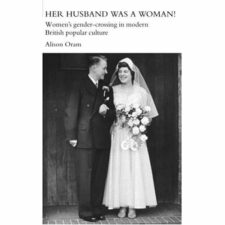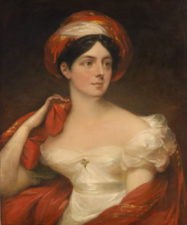On 5 March 1777 Caroline Herschel made her first appearance as a professional singer (her brother William conducting), at the Upper Assembly Rooms at Bath in Handel’s oratorio Judas Maccabeus.This information comes from Orlando: Women’s Writing in the British Isles from the Beginnings to the Present, but Herschel is unusual among the authors with entries in Orlando because she is not remembered primarily as a writer but as an astronomer: in her lifetime “the only woman in Britain to earn her living from the pursuit of science.” So for those who notice her singing debut in “This Day in Orlando” it might come as a surprise.
In fact her singing meant an immense amount to her when she was young and under-appreciated. She is a classic case of a girl seen by her family as a family asset, to be used for the common good, not her own. She was born as Carolina Lucretia, in the Electorate of Hanover, into a large family which was using its talents to rise from the labouring class. She was one of the youngest (the only other girl was one of the eldest, and got married when Carolina was five). Her family did not consider her talented: they very probably valued her the less after she barely survived an attack of smallpox at four and was left (in her own words) “totally disfigured”. Her education was strictly limited at the behest of her mother, who (to quote Orlando) “had firmly traditional views on gender roles, and as far as possible prevented her husband from extending to Carolina the general and musical education which the sons of the family received as a matter of course.”
There was a reason for this. Carolina, uneducated, was vital to the family economy. She was kept busy “doing the drudgery of the scullery” (saving the wages which would have otherwise been spent on a servant). Her own words again: “Poor I got many a whipping for being awkward at supplying the place of a footman or waiter.” But she shared the drive for self-improvement which marked her father and her brother William (both of whom worked as musicians in the band of the Hanoverian Foot Guards) and which was foreign to her mother. She got a neighbour to teach her fine needlework in secret. Her father allowed her violin lessons and on her own account, again in secret, she added singing lessons.
Brother William changed her life. He had emigrated to England (which had the same monarch as Hanover, but far more opportunities for a poor and gifted young man). He settled in Bath and found an excellent job as an organist. On a rare visit home he asked the others to let him import Carolina, who was now twenty-one, as his housekeeper. He thought, too, that it would be worthwhile for her to pursue her study of singing.
This proposal caused a family row: her mother and her eldest brother, Jacob, did not want to lose her services, and Jacob thought it ridiculous to invest in training her voice. But William won. He put up the money for a servant to replace his sister, and after working furiously on future supplies of stockings and ruffles for her other brothers, Carolina set out for Bath.
At first she hated it. She was homesick, and her duties for William included going out to do the household shopping in a language she did not know, where the goods in the shops were all wrong and the currency a puzzle. But there was one difference from her life in Hanover: education. Their landlady tutored her in English genteel cookery (making puddings, pies, jams, and pickles); William tutored her, often at mealtimes, in English, arithmetic, geometry, book-keeping, and voice training. All her accomplishments still had a strong utilitarian bias. In addition to housekeeping she spent hours copying out music for her brother. The singing lessons were aimed at making her a performer in oratorios; they led up to her debut on 5 March 1777.
Of course her singing is not the reason we have heard of Caroline Herschel (she changed the form of her first name to make it sound more English). William had already become a passionate amateur astronomer, and where William led Caroline was bound to follow. Her career as a singer lasted for five years, but before those years even began she had recorded that as an assistant astronomer she was just as useful as a first-year apprentice boy. As well as sitting up all night making coffee, keeping the fire going, recording and copying, she was soon sweeping the sky for comets or nebulae with a specially-designed telescope. Orlando says “she describes her task of sweeping as originally imposed, not chosen.” But as her telescope was regularly upgraded to the latest model she began to enjoy this work more and more. In 1786 she discovered what Frances Burney delightedly called “the first lady’s comet”, and she went on to discover seven more. The next year the Crown awarded her a grant of fifty pounds a year as assistant to William, who was now an astronomer on the royal payroll. She called it “the first money I ever in all my lifetime thought myself to be at liberty to spend to my own liking.”
Honours flowed in on Caroline Herschel towards the end of her very long life, from all over the educated world. She was elected an honorary member of the Royal Astronomical Society, then an honorary member of the Royal Irish Academy. She was awarded the King of Prussia’s Gold Medal for Science, with a testimonial on the occasion from Alexander Humboldt. But perhaps even more telling are the personal tributes. A French astronomer, Joseph Jéröme de Lalande, named his daughter Caroline after her (as he named his son Isaac after the discoverer of gravity). Young ladies at Augusta, Georgia, USA, formed a Caroline Herschel Association and raised serious money to buy themselves a state-of-the-art telescope.
And yet, as so often with female fame, there is another side. She continued to see herself as William’s assistant, serving the family which had disregarded her. When William got married at past middle age, Caroline was emotionally displaced, though in the long run she transferred her allegiance and assistance to William’s son, Sir John Herschel, whose honours later included the presidency of the Royal Astronomical Society. When William died, Caroline moved back to Hanover to look after her last surviving brother: she hardly knew him, but she felt he needed her. Her decision, which she lived to regret, seems to suggest that she still defined herself primarily through her ancillary role within her family.
Her extensive and characterful memoirs, more than her astronomical writings, are what qualifies her for a place in a textbase about women writers. About her own work she writes self-depreciatingly yet also with her own kind of pride. She told her nephew: “Whoever says too much of me says too little of your father! and can only cause me uneasiness.” Yet she admitted to being vain about her astronomical discoveries, and added tellingly: “among gentlemen the commodity [of vanity] is generally stiled ambition.”
Several recent scholars have sought to unravel her inconsistencies. Perhaps the easiest way for a modern to understand her is to see her as a working, professional woman. She looks on her family rather as a long-term employee does the management: she sees its shortcomings but remains unshakably loyal. For the family, and for astronomy, she sets herself an impossibly high standard of service, and then she meets that standard.. When she slips in the dark, in deep snow around the telescope, and impales her leg on a massive metal hook, her brother and two helpers cannot free her, but she frees herself by ruthlessly tearing her flesh, and is “obliged to be my own surgeon.” Her account of the incident concludes on “the comfort to know that my Brother was no loser through this accident.” When she discovers another new comet at forty-seven (the last of her career, as it turned out), she sets out on horseback after only an hour’s sleep to carry the news twenty-seven miles to the Royal Observatory at Greenwich. Heroic endeavour, for her, was a staple of the working life.
Orlando’s Links screen to its entry on Caroline Herschel shows that a remarkable number of later women writers included her in those round-ups of hidden female achievement that have marked the progress of the feminist movement. This praise from other women began with the teenage Elizabeth Ogilvy Benger in 1791 and passed from voice to voice, forward to Millicent Garrett Fawcett and more recently Adrienne Rich. (It makes an unbroken chain: Fawcett was born the year before Herschel died; Rich was born the year Fawcett died.) Caroline Herschel’s heroic professionalism makes her first public performance worthy of commemoration.
This information is provided by Dr Isobel Grundy, University of Alberta, and comes from Orlando: Women’s Writing in the British Isles from the Beginnings to the Present, Cambridge University Press, by subscription: see http://orlando.cambridge.org.

